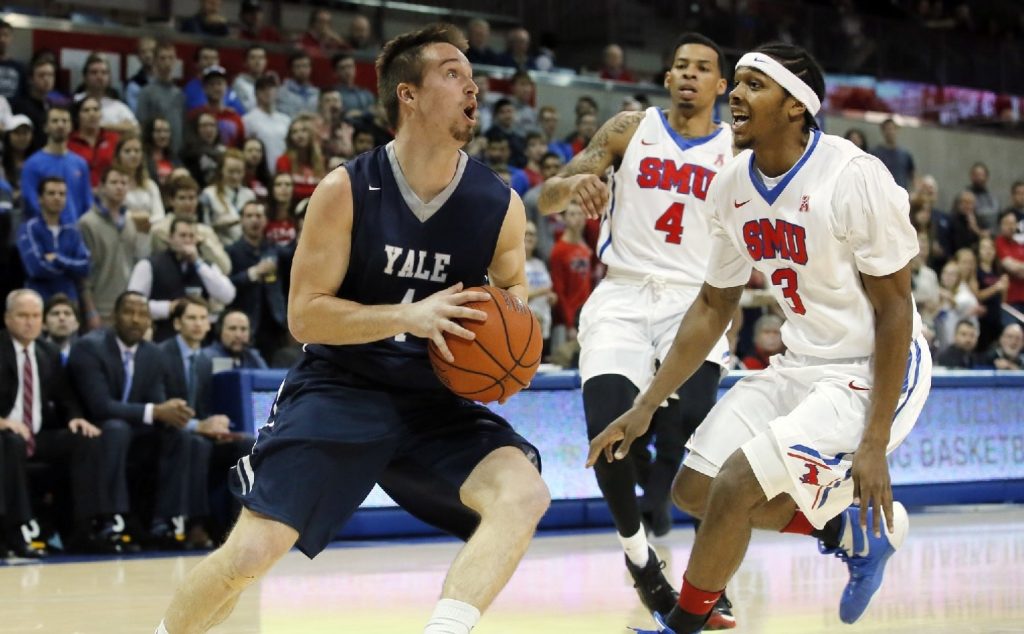
In an interview last year with ESPN, former OCR head Catherine Lhamon gushed, “The capturing of the hearts and minds of the American public is what has moved this issue. The response of student communities to sexual violence among athletes has been really important.” Lhamon could have been referring to the expulsion of former Yale basketball captain Jack Montague—an event that generated national news coverage, on-campus protests from activists, and the campus Women’s Center.
The only problem: the process that Yale used to go after Montague was one of the most dubious employed in the post-Dear Colleague letter era. Despite a month of pressure, the accuser refused to file a complaint against Montague for an incident that had occurred almost one year before. (The university was under heavy media and activist pressure for an alleged softness on campus sexual assault at the time.) So—according to the report prepared by Yale’s hired investigator—a Title IX official improperly told the student that Montague had faced an earlier allegation, which seems to have encouraged her to move forward. Even then, she was unwilling to serve as the complainant, so Yale’s Title IX office, desperate to see a case against Montague proceed, filed the charges itself.
Once the hearing commenced, however, Yale allowed the accuser to have all the rights she would have received as a complainant. The panel found Montague guilty after a hearing for which no transcript was retained (per Yale’s policies) and for which the panelists destroyed all their notes (per Yale’s policies).
[Yale’s Sex Assault Report Is a Fabrication]
Montague filed a lawsuit in 2016. The case dragged on for several years until a jaw-dropping ruling from Judge Alfred Covello, denying summary judgment to Yale on most (though, as will be seen, not all) key counts. So, barring a settlement, the Montague case will become the second campus fairness trial of 2019, after the pending BC case. You can read the ruling here.
Covello’s ruling quickly dispensed of Yale’s procedural arguments for why the court should avoid considering the case. The university had demanded near-absolute deference, but the judge was unpersuaded: “Because Montague’s expulsion was based on sexual misconduct, and not ‘a genuinely academic decision,’ this court need not confer deference to Yale on the breach of contract claims.”
Covello also rejected Yale’s request that the university prevails as long as its actions weren’t arbitrary and capricious. First of all, he noted, no relevant precedent for the Second Circuit supported this line of argument. Second, and perhaps more interestingly, he maintained that even if he evaluated the case under this standard, “Montague has demonstrated an issue of fact for the jury with respect to whether Yale’s actions were arbitrary and capricious, given the evidence presented.” In his previous ruling on the case, Covello had referred to the accuser as the “victim.” No such designation appeared in this opinion.
Covello cleared enough allegations that a trial would place the entire process through which Montague was charged and found guilty under the microscope. Yale will have to defend against the claim that it violated Montague’s FERPA rights by allegedly disclosing his earlier discipline to the accuser. It will have to defend against the claim that its Title IX officials improperly manipulated procedures to bring charges against Montague. It will have to defend against the claim that the head of its Title IX tribunal improperly placed himself on the panel that judged Montague after he was allegedly involved in the scheme to find a way for the accuser to bring charges. It will have to defend against the claim that—having brought the charges through the Title IX office—it gave the accuser the rights of the complainant in the hearing. And—perhaps most remarkably—it will have to defend against the claim that it improperly found Montague guilty, despite a lack of evidence to substantiate the allegation.
[The Media Slams Yale Student Verdict on Rape]
Covello’s ruling also addressed two broader issues, giving one victory to each side. While Massachusetts state law requires universities to exercise basic fairness in handling campus discipline cases, that’s not so in Connecticut. Yet Judge Covello has allowed Montague’s basic fairness claim to move forward. Montague, he noted, contended that “as captain of the basketball team, ‘his fate was virtually guaranteed.’” A jury will be allowed to test this proposition.
On the other hand, Covello granted Yale’s motion for summary judgment on the Title IX count. Two courts have sided with accused students on such a question (Drake and Montana State), but in general, courts have been reluctant to concede that students have sufficient evidence to show gender discrimination at summary judgment. But if Montague couldn’t win on gender discrimination at summary judgment—Yale did everything here but take out a full-page ad in the New York Times rejoicing that it had punished the captain of the men’s basketball team, amidst a process characterized by biased training—it’s hard to imagine any accused student that could do so. In this area, Covello seems to have followed the reasoning of the recent (non-precedential) summary order issued by the Second Circuit in a far weaker lawsuit, filed by a student from Colgate.
The two sides meet in a court-ordered settlement conference on May 7. Further clarity on the subsequent schedule should emerge then.
Continued troubling decisions that Title IX not applies for male students.